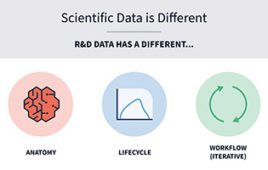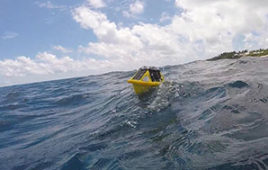International experts to converge in Singapore for second Keystone Symposia Conference on Biofuels
SILVERTHORNE, February 16, 2011 ? Keystone Symposia on Molecular and Cellular Biology and Singapore’s Agency for Science Technology and Research (A*STAR) announce the second Keystone Symposia conference on “Biofuels” in Singapore, March 1-6, 2011, at Swissôtel The Stamford.
The conference will cover cellulosic ethanol, algal biofuels and the development of new biomass feedstocks. Talks will also encompass economic and environmental considerations of biofuels technologies and integration of biofuels into the existing energy infrastructure. The meeting will bring together academic and industrial scientists, as well as planning and policy makers, with the goal of identifying the most promising avenues to a viable biofuels future.
Organizing the scientific content of the conference are Professor Stephen P. Mayfield of the University of California, San Diego, Dr. Martin Keller of Oak Ridge National Laboratory (a US Department of Energy-funded biofuels research center) and Dr. Jeffrey P. Obbard, formerly of A*STAR’s Institute of Chemical and Engineering Sciences.
Citing the timeliness of this conference, Professor Mayfield said, “One of the greatest challenges we face today is to develop efficient, sustainable and scalable processes for converting sunlight energy into the food and fuel the world needs. No single renewable-energy strategy will be able to provide a total solution, but a combination of strategies that can be coordinated and integrated effectively has the potential to significantly decrease our dependence on fossil fuel. At this critical, pivotal time in mapping a new global energy strategy, this symposium will address the potential of cellulosic and algal produced bioenergy as part of a sustainable future for our planet.”
While total global biofuels production today is presently about 1% of traded energy, or about 20 billion gallons a year and a $40 billion market, it is expected to reach 144 billion gallons per year by 2022 (a $600-700 billion market), based on standards set by various governments for renewable energy use (source: US Department of Energy).
According to Professor Mayfield, the fact that the globe is expected to have completely exhausted its entire supply of liquid petroleum by 2047 (leaving only tar sands and oil shale) means that production of biofuels will need to be at least 50% as great as petroleum production volume by 2050 to maintain existing energy production rates. Since the world demand for energy is increasing at 2% per year, it is projected that by 2050 we will need to be producing the equivalent of 190 million barrels of oil per day or 2.9 trillion gallons per year, half of which (1.45 trillion gallons per year or 1,450 billion gallons per year) will need to come from biofuels.
The conference will convene on the evening of Monday, March 1 with an introduction by Guest of Honor Lim Chuan Poh, Chairman of A*STAR, opening remarks by Professor Charles F. Zukoski of A*STAR’s Science and Engineering Research Council (SERC) and a keynote address by Professor Richard C.J. Somerville of the University of California, San Diego on “Speaking Truth to Power: The Scientific Case for Urgent Action to Avoid Severe Climate Disruption.” Speakers over the subsequent four days from academia, government and industry will include: Dr. Adam Brown of the International Energy Agency, Professor Timothy Goodenough of the University of Wisconsin-Madison/Great Lakes Bioenergy, Dr. Arthur Grossman of Solazyme, Inc., Professor Lonnie Ingram of the University of Florida, Professor Jay D. Keasling of the University of California, Berkeley, Professor Lee Rybeck Lynd of Dartmouth College and Professor Amaral Weber of Universidade de São Paulo.
Commenting on the upcoming conference, Dr. Keith Carpenter, Executive Director of the Institute of Chemical and Engineering Sciences, said, “Diversifying our resources away from total dependence on crude oil towards more sustainable sources of fuels and chemicals is a major issue globally for industry and for the economies of many countries. As a society, we face the problem of ensuring reasonable standards of living for all, reducing poverty and maintaining economic growth, whilst minimizing the impact we have on our environment. This symposium will bring together leading experts and policy makers from academia, from industry and from the public sector to suggest novel ways to address the challenge of providing the energy, fuels and chemicals we need without destroying the planet we live on.”
Keystone Symposia conferences are well known for sparking collaborations as a result of their fairly small, intimate size as well as free time and poster sessions that encourage lively interaction. This meeting will additionally feature a special networking dinner at the Asian Civilisations Museum which will allow visiting attendees to meet with individuals from Singapore’s energy sector. A tour of Jurong Island, where A*STAR maintains research facilities within its Institute for Chemical and Engineering Sciences, will give participants a first-hand look at the biofuels research work.
The conference is also supported by the Singapore Tourism Board. For the full program and more details, please visit www.keystonesymposia.org/biofuels.
About Keystone Symposia on Molecular and Cellular Biology
Keystone Symposia on Molecular and Cellular Biology, a 501(c)3 nonprofit organization, has been conducting internationally renowned, open scientific conferences since 1972 and has been headquartered in Summit County, Colorado since 1990 when the organization left the University of California at Los Angeles. Annually, Keystone Symposia holds more than 50 meetings involving more than 13,000 scientists from around the world. Registration fees are supplemented by generous monetary support from corporate, foundation and individual donors as well as government grants.
More information on Keystone Symposia can be found at www.keystonesymposia.org.
About the Institute of Chemical and Engineering Sciences (ICES)
Institute of Chemical and Engineering Sciences (ICES) is a member of the Agency for Science, Technology and Research (A*STAR). Established in 2002, its mission is to carry out world-class scientific research, to develop novel technology and to nurture creative scientists and engineers to support economic growth in Singapore to make a positive difference to society. The research area covers chemistry and chemical engineering science, combined with advanced analytical characterization and measurement to develop state-of-the-art technology for the petrochemical, general chemical, fine chemical and pharmaceutical industries.
For more information, visit www.ices.a-star.edu.sg
For collaboration enquiries, please contact: [email protected]
About the Agency for Science, Technology and Research (A*STAR)
The Agency for Science, Technology and Research (A*STAR) is the lead agency for fostering world-class scientific research and talent for a vibrant knowledge-based and innovation-driven Singapore. A*STAR oversees 14 biomedical sciences and physical sciences and engineering research institutes, and seven consortia and centers, which are located in Biopolis and Fusionopolis, as well as their immediate vicinity.
A*STAR supports Singapore’s key economic clusters by providing intellectual, human and industrial capital to its partners in industry. It also supports extramural research in the universities, hospitals and research centers, and with other local and international partners.
For more information about A*STAR, please visit www.a-star.edu.sg.




